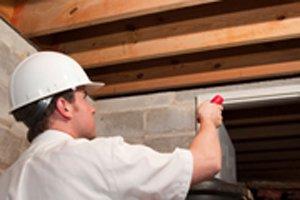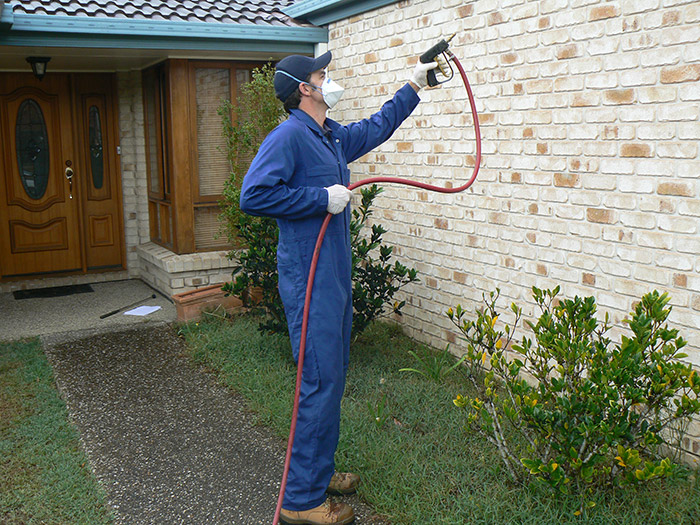How Much Does It Cost To Hire An Insect Control Service?
Insects such as roaches and ants can be a terrible problem throughout your home, but often go undetected for a long time. Eventually you will have a real infestation on your hands. You may have tried some DIY pest control with products such as boric acid, ant traps, “roach motels”, or any number of commercially available sprays like Raid, Black Flag, or Ortho. Some of these can be effective when the pests are first noticed, such as when you first spot a small hornet’s nest. In other cases, such as combatting ant or roach infestations, all they can do is hold the line. They don’t take the battle back to the pests’ lairs.
The average cost to hire an insect control service averages between $108 and $261 depending on the problem. Hiring a professional is the best way to rid your home of pests, not just convince them to stay out of your sight. If you are concerned about the cost of calling in a pro to take care of your pest problem, here are a few things to consider.
Some insects are wood-boring. They can damage your house’s structure and cost you tens of thousands of dollars in repair, or can make your home structurally unlivable.
Stinging and biting insects can range from merely painful when they attack to literally deadly.
Many household pests carry diseases such as salmonella (cockroaches) and Hantavirus (mice and rats).
Even an insect as relatively harmless as a pincher bug will leave eggs and feces in your food.
While you may know enough to avoid dangerous insects like black widows, scorpions, or fire ants, your children and pets may not.
One-Time Removal or Contract?
If you have never had an insect problem in your home before and very suddenly you start to see the signs, you may be able to call in the professionals for a one-time extermination. However, if you start to notice that you have an ongoing insect problem, you may opt to hire an exterminator on a contract basis.
Frequency of the Visit
Some exterminators liken their task to house cleaning: the longer you go between cleanings, the harder it is to get the job done. For this reason, exterminators will often have a higher-cost initial visit followed by cheaper maintenance visits

Pest Control Workers – What They Do
Unwanted creatures that infest buildings or surrounding areas can pose serious risks to health and safety. Pest control workers remove these creatures from households, apartment buildings, places of businesses, and other structures, to protect people and maintain structural integrity.
Common pests include roaches, rats, mice, spiders, termites, ants, and bedbugs. Using information about pests’ biology and habits, along with an arsenal of pest management techniques, pest control workers locate, identify, and remove pests. They set traps, apply pesticides, and even modify structures at the discretion of the customer.
Many pest problems require pesticide application. Pest control workers use two different types of pesticides—general use and restricted use. General use pesticides are the most widely used and are available in diluted concentrations to the public. Restricted use pesticides are used for the most severe infestations and are available only to licensed professionals. Because of their potential harm to pest control workers, customers, and the environment, restricted-use pesticides are heavily regulated by Federal law.
For some jobs, pest control workers use a combination of pest management techniques, a practice known as integrated pest management. One method involves using proper sanitation and creating physical barriers. Pests cannot survive without food and will not infest a building if they cannot enter it. Another method involves using baits that either destroy the pests or prevent them from reproducing. Yet another method involves using mechanical devices, such as traps, that remove pests from the immediate environment.
Some workers use pest-management technology to make home inspections more efficient. This technology, which uses microchips to identify areas of pest activity, is used most frequently for termites. The chips, which are placed in baiting stations, emit signals that can tell pest control workers if is termites are present. Workers pick up the signals using a device similar to a metal detector, allowing them to quickly evaluate an entire building
Pest Control Services
standard Pest Control treatment will target Cockroaches, Webbing spiders, Silverfish and Coastal Brown Ants in residential homes and additional Pests can be treated upon your request
Fact Sheet For General Pest Control Sprays
You don’t have to do any preparation before you get a general spray done in your home. Therefore there is no need to empty any cupboards before the pest controller arrives (only if there is a bad infestation of German Cockroaches).
The chemicals used for a general pest control spray are totally safe for your family and pets. However, we do recommend that any pet food and water bowls are removed prior to treatment and cleaned after treatment. The chemicals however used may harm reptiles and fish. We recommend that reptiles are removed and that fish tanks are covered and the aerator pumps turned off during treatment and ½ an hour after treatment.
If you are moving into a new home and would like to have it sprayed it is best to have it done before you move in to ensure complete coverage of the sprayed areas, i.e. no furniture to spray around and all cleaning is done.
If the house is vacant the power needs to be turned on so the job can be fully completed as we treat the roof void with an electric applicator.
For best results, any painting or cleaning including carpet cleaning should be done prior to the pest control being carried out. Do not clean down spider webs, this should be done 7 – 10 days after the treatment. Cleaning windows should also be left until after the job is done.
Once the spray has been carried out in your home, windows can be cleaned using newspaper or a squeegee with cleaning agents. DO NOT HOSE DOWN THE WINDOWS OR HOUSE.
Brush spider webs down 7 – 10 days after the pest control spray has been done.
A general pest control treatment covers spiders, silverfish, cockroaches and coastal brown ants. It does not include termites, borers rodents or fleas. These pests require a separate treatment and a fee is charged accordingly.
The general spray is a residual treatment. The initial spray will kill any pests that are present. Pests that come in contact with the residue will not always die instantly. They become sick and eventually die.
If pests have only just come in contact with the residue they can appear quite normal. If they are in areas where they would not usually be seen, such as in the middle of the floor or wall during the day, the best thing to do is to monitor their condition. If new pests are continually being seen, then a callback may be necessary.
A general pest control treatment should be carried out annually (or 6 monthly for problem areas) from the date of initial treatment to maintain a pest free home for you and your family.
To reduce the likelihood of an infestation of cockroaches, ants and mice in your home, you need to ensure that any food scraps and crumbs are daily cleaned from floors, bench-tops and bins.
Leaking plumbing and appliances entice cockroaches, that carry diseases, to breed around these areas as they need moisture and also creates a risk for termite infestation.
Each pest control operator is local and trained in the specific problems in your area, so he will be able to find the problem faster and treat it in the best, the safest and the most economical manner.
STOP PESTS IN YOUR TEMPE
PESTS OFFER INSPECTIONS AND SERVICES FOR:
Bed Bugs: offer liquid treatments for bed bugs. have found this is a very efficient and affordable service for most situations.
Birds: offer limited services for Birds. Offering Ultrasonic bird repellent solutions. DO NOT offer services that cause death to birds.
German Roaches: offer baiting and residual chemical treatment along with void treatments both vapor & foam applications for both commercial and residential structures.
Rodents: offer two kinds of baiting systems: A low toxicity anticoagulant that is placed in a bait box that reduces the population and allows us to maintain it; physical non-chemical stations to exclude the rodents from structures.
Scorpions: offer customized intensive Scorpions service and detailed Black Light programs with site graphing and tracking for high activity sites.
Termites: offer the latest chemistry in termite applications for customized termite programs both corrective and proactive with 1-5 year warranty terms

Food safety advice for businesses
Pests
If there are pests at your food premises they are likely to damage and contaminate food. If discovered during an inspection, or as a result of a complaint, this could lead to your premises being closed under a Hygiene Emergency Prohibition Notice, costing you money and potentially ruining the reputation of your business.
As a food business proprietor it is your responsibility to have appropriate arrangements in place to effectively prevent pests from entering.
The three main groups of pests that are encountered in food businesses are:
Rodents – rats and mice.
Insects – cockroaches, beetles, ants and flies.
Birds – pigeons etc
The legislation requires that businesses must ensure that the layout, design, construction and size of food premises permit good food hygiene practices, including protection against external sources of contamination such as pests.
The legislation also requires that adequate procedures be in place to ensure pests are controlled. Setting up a pest control contract is good practice, but remember that the ultimate responsibility for any pest problem lies with you, as the proprietor of the food business. Laying of baits and poisons should be left to the professionals – commercially available baits are not adequate for use in food businesses and can be a source of food contamination – however you can and should carry out visual checks of the premises for signs of pest presence.